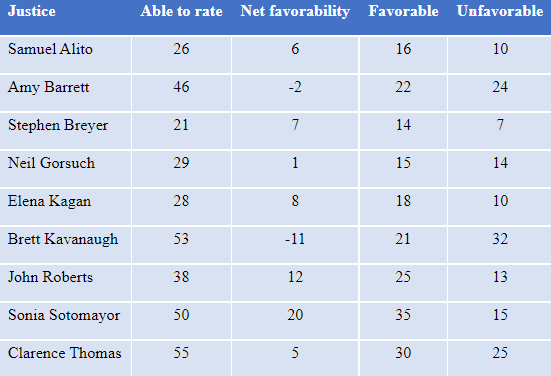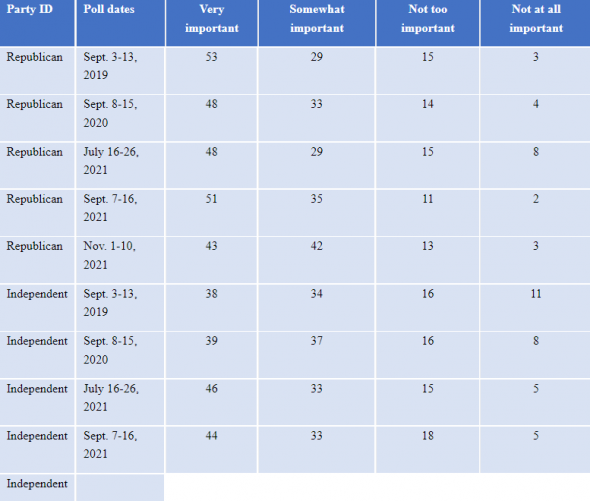Marquette Law Poll Guide: Justice Breyer data from U.S. Supreme Court surveys, 2019-22
Presented by Dr. Charles Franklin, director of the Marquette Law School Poll.
MILWAUKEE —Even to the day it was reported that Justice Stephen Breyer is retiring from the U.S. Supreme Court, he consistently ranked as the justice whom the fewest Americans know.
In results released on Wednesday, Jan. 26, before word of Breyer’s plans circulated, the Marquette Law School Poll’s Supreme Court Survey found that only 21% of people nationwide said they knew enough about Breyer to have an opinion about him.
The Marquette Law Poll has examined nationwide opinion about the Supreme Court six times, beginning in 2019. This news release describes what has been found about opinions of Breyer and of the way court selections have been handled.
Justice Breyer Favorability
Justice Breyer has consistently been the least well-known justice among the general public, with fewer than 25% able to offer an opinion of him.
Table 1 shows the public’s ability to rate, and the favorability ratings, of all nine justices in the Jan. 10-21, 2022, survey. All numbers in tables are percentages.

Table 1: Recognition and favorability ratings of justices, January 2022
The trend in favorability of Justice Breyer is shown in Table 2.

Table 2: Percent of people nationwide who rated Justice Breyer, and their ratings, September 2019-January 2022
“Should Justice Breyer retire?” from July 16-26, 2021
In the Marquette Law Poll’s Supreme Court survey of July 2021, a national sample of 1,010 adults were asked about the role of partisan control of the presidency and Senate in the timing of Supreme Court retirements.
A majority of the public thought that justices should not consider partisan control of the presidency and Senate when deciding the timing of their retirements. However, when given information that some Democrats were urging Justice Stephen Breyer to retire while there was a Democratic president and Democratic control of the Senate, more people supported a justice’s retiring with politics in mind, although it remained a minority overall.
When asked, “Do you think justices should consider the party in control of the White House and Senate as they decide when to retire?” 28% said justices should consider party control, while 72% said they should not consider this. This item was asked of a random half of all those surveyed at the time. The other random half of respondents was provided more information and context in the form of an alternative question: “Justice Stephen Breyer is 82 years old and the oldest member of the Court. He was nominated to the court in 1994 by President Clinton. Some Democrats are urging Breyer to retire now while there are a Democratic president and Senate. Do you think Justices should consider the party in control of the White House and Senate as they decide when to retire?” With this wording, 39% said justices should consider party control, while 60 percent said they should not.
The partisan information in the question boosted support for political timing of retirements across partisan identification among respondents, especially Democrats, as shown in Tables 3 and 4.

Table 3: “Do you think Justices should consider the party in control of the White House and senate as they decide when to retire?,” July 2021

Table 4: “Justice Stephen Breyer is 82 years old and the oldest member of the Court. He was nominated to the court in 1994 by President Clinton. Some Democrats are urging Breyer to retire now while there are a Democratic president and senate. Do you think Justices should consider the party in control of the White House and senate as they decide when to retire?,” July 2021
Importance of the next nomination to the Supreme Court
Since 2019, the Marquette Law Poll’s national Supreme Court survey has asked how important the next Supreme Court appointment is to the respondent. There has been only a little change in public opinion during this time, although Democrats became somewhat more concerned, until that percentage dropped in November 2021.

Table 5: “How important is the choice of the next Supreme Court justice to you personally?,” September 2019-Nov. 2021
Importance of the next nomination to the Supreme Court, by party identification
Democrats saw Court nominations as more important to them than did Republicans in 2020 and 2021, although the percentage of Democrats saying “very important” fell in November 2021.

Table 6: “How important is the choice of the next Supreme Court Justice to you personally?” by party identification, September 2019-Nov. 2021
NOTE: This press release was submitted to Urban Milwaukee and was not written by an Urban Milwaukee writer. While it is believed to be reliable, Urban Milwaukee does not guarantee its accuracy or completeness.
Recent Press Releases by Marquette University
New Marquette Law School Poll finds large majority of Wisconsin voters not yet tuned in to who is running in major 2026 elections
Oct 29th, 2025 by Marquette UniversityNo candidate has established strong position in public favorability in governor, state Supreme Court races; large majorities of voters undecided
New Marquette Law School National Survey Finds Large Majority Think Political Violence is a Big Problem, But With Sharp Partisan Differences
Oct 1st, 2025 by Marquette UniversityAmericans are overall pessimistic on reducing intense political conflict; half of those polled say heated language by leaders makes violence more likely





















